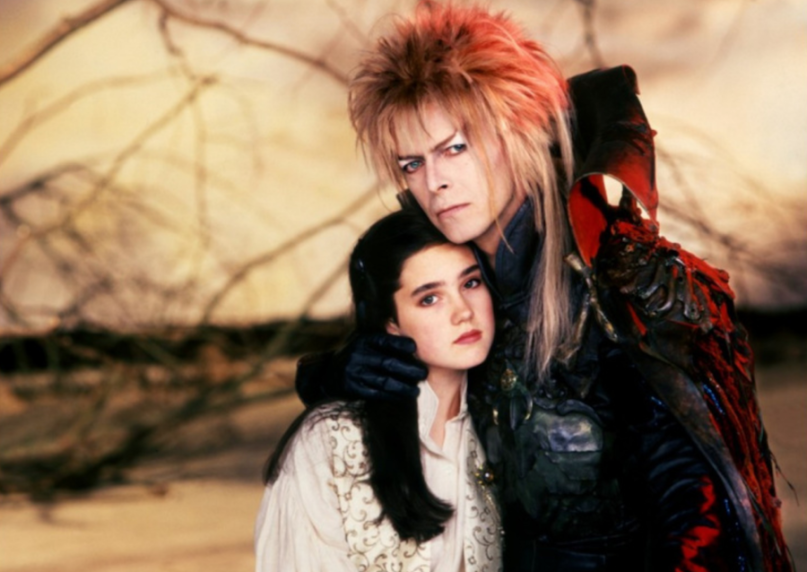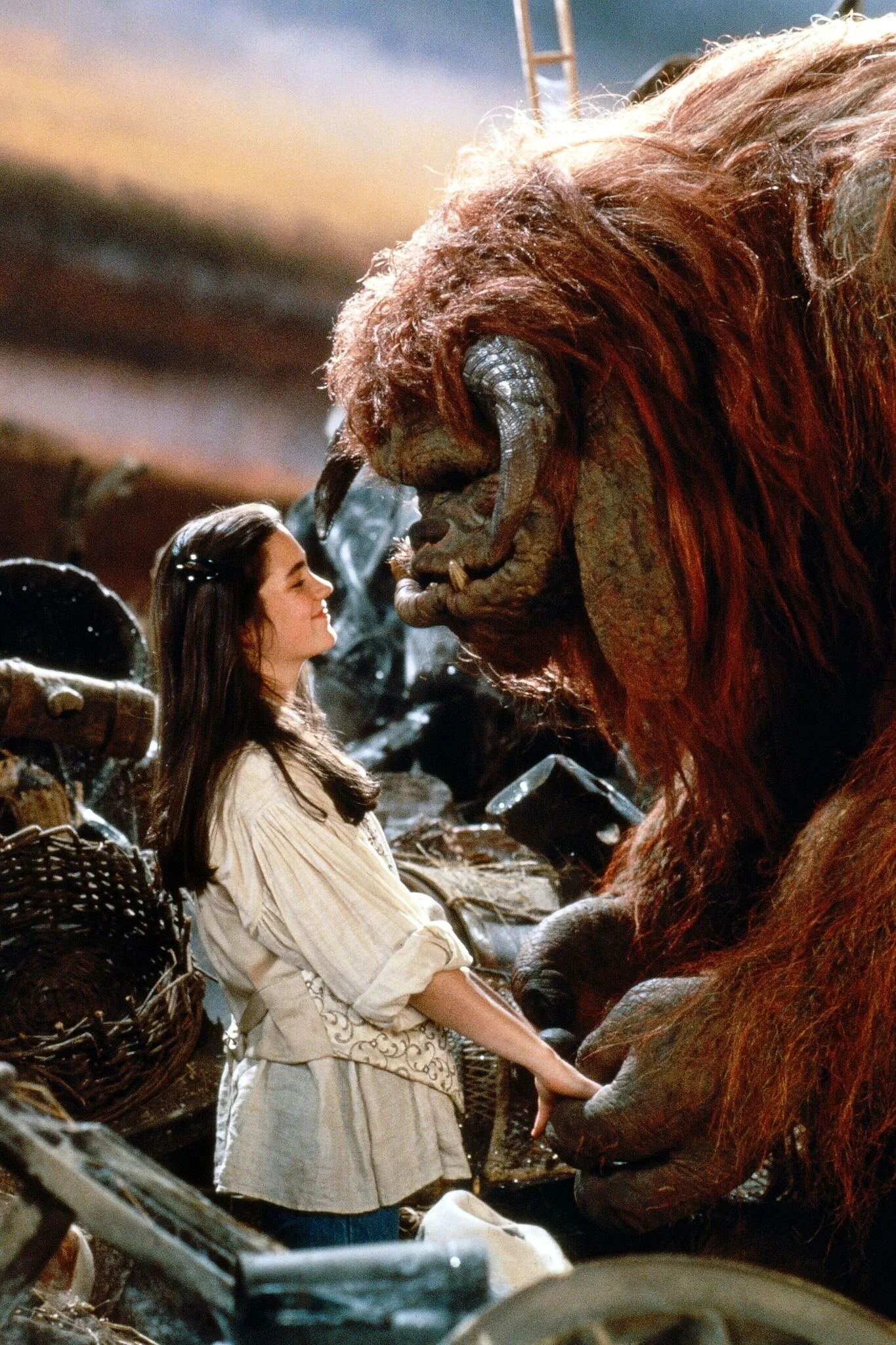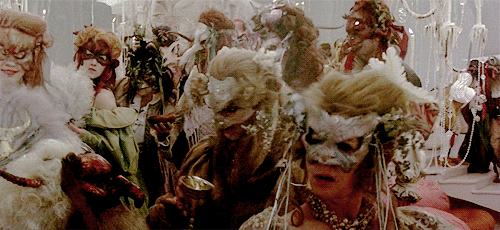Control Nathan Rabin 4.0 #84 Labyrinth (1986)
Welcome, friends, to the latest entry in Control Nathan Rabin 4.0. It’s the career and site-sustaining column that gives YOU, the kindly, Christ-like, unbelievably sexy Nathan Rabin’s Happy Place patron, an opportunity to choose a movie that I must watch, and then write about, in exchange for a one-time, one hundred dollar pledge to the site’s Patreon account. The price goes down to seventy-five dollars for all subsequent choices.
Or you can be like two kind patrons and use this column to commission a series of pieces about a filmmaker or actor. I’m nearly done with my patron-funded deep dive into the works of Sam Peckinpah, many of which, truth be told, have some pretty fucked up shit in them, and I’ve just begun a project on the movies of the late, great, fervently mourned David Bowie.
I’ve been going in strict chronological order on the Peckinpah column but hopping around in time with Bowie. It seems to suit the seemingly random nature of Bowie’s acting career and it gives me an unbeatable excuse to re-visit 1986’s Labyrinth for maybe the first time since I saw it in theaters as a ten-year old boy following the death of yet another beloved part of the film’s creative team, in this case Terry Jones of Monty Python, who died recently at 77 after wrestling very publicly with Dementia for several years.
Name a more iconic duo!
Jones wrote the Labyrinth screenplay from a story by children’s author Dennis Lee and director Jim Henson himself although Jones was reportedly far from the only writer to work on the script. Everyone from Executive Producer George Lucas to Henson to Lee to Elaine May worked on the more than twenty-five treatments and drafts that were composed over a period of years.
Though Jones is the only credited screenwriter, the end result apparently differs greatly from Jones’ original vision for the film. With that many writers all scribbling away furiously it’s amazing the movie holds together at all, let alone that it represents Jim Henson’s vision in such a powerful, pure and unforgettable way.
Even if Jones had written every word that appears in Labyrinth he would still only be one of a seemingly infinite number of craftsmen and artisans responsible for the film’s brilliance.
The last time I saw Labyrinth I was a child but I have re-experienced certain aspects of it repeatedly since then, both in the form of a Muppet Babies episode that re-purposed huge chunks of the movie’s plot, characters and footage for its own irreverent purposes and multiple visits with my family to Atlanta’s magnificent Center For Puppetry Arts, where exhibits featuring puppets from Sesame Street, The Dark Crystal, Labyrinth and other Henson productions are a central attraction.
Looking at the puppets created by Henson and his associates I experienced something approaching rapturous awe. There’s something about the art of puppetry, and Henson and Labyrinth really represents the very apex of puppetry, that brings out the child in everyone.
When I was a younger writer, I only ever used the phrase “movie magic” in a bitterly ironic fashion, to sarcastically insult productions utterly devoid of anything approaching magic, cinematic or otherwise, just as I never used the phrase “funnyman” to describe anyone legitimately funny, only the Rob Schneiders of the world.
To paraphrase Bob Dylan, I was so much older then. I’m younger than that now. These days, when I use the phrase “movie magic” it’s to describe movies like Labyrinth that legitimately seem miraculous in their craft and attention to detail.
The sheer amount of work that went into Labyrinth is absolutely staggering. From the sets to the costumes to the puppets to the in-camera special effects Labyrinth is triumph of imagination. It resembles Who Framed Roger Rabbit in the sheer number of absurdly gifted craftsmen working at the very pinnacle of their talent and creativity to realize a fully-fleshed out creative vision down to a molecular, cellular level.
But before Labyrinth can usher us into a magical world of wonder and imagination we first experience an unfortunately puppet-free opening whose tone is markedly different than the rest of the film. You can all but feel Henson’s unease directing only human characters in a puppet-free realm as we’re introduced to our plucky 16 year old protagonist Sarah (Jennifer Connelly) at her absolute worst.
Sarah is responding, poorly, to her hated step-mother’s request that she baby-sit her baby half-brother Toby by throwing a temper tantrum and wishing out loud that goblins would take Toby away.
Jareth the Goblin King (David Bowie) and his minions hear Sarah’s cry and grant her wish. She goes to check on Toby in the crib only to discover that he has vanished, abducted by a disconcertingly sexy goblin monarch who gives her thirteen hours to navigate a perilous labyrinth and save her brother before he becomes property of the Goblin kingdom forever.
Look, I’m going to say this upfront so that I am not misunderstood: NOBODY deserves to have a sibling stolen by the Goblin King. If that’s happened to you, I want you to know that it’s not your fault, even if you uttered the magical words beckoning him to make off with the youngling in question.
The only person to blame is that sick fuck Jareth the Goblin King, wiggling his enormous dick around in a kid’s film and stealing babies all willy nilly.
But Sarah is so petulant and bratty that you almost can’t blame Jareth for doing exactly what she begged him to do. It isn’t until puppets and magical creatures enter the equation that Connelly’s performance, and the film as whole, finds its footing and finds and settles on a tone decidedly different and less feverishly melodramatic than its opening.
Labyrinth sends Sarah on a hero’s journey to prove herself and find herself in a fantastical world both breathtakingly beautiful and the stuff of nightmares. She begins her quest from a place of petulance and immaturity, resentment and selfishness. She must learn, over the course of the film, to eschew the cozy comforts of childhood, with its endless, societally-condoned narcissism, and embrace the responsibilities and sacrifice endemic to adulthood.
The production designer for Labyrinth has littered Sarah’s room with literature and toys referencing the movie’s inspirations, whether in the form of Alice in Wonderland and Where the Wild Things Are books or a stuffed Winnie the Pooh.
Labyrinth is inspired by Alice in Wonderland in the same way the Beatles MAY have influenced Oasis and ELO but the reference-palooza that opens the film illustrates that Henson’s mesmerizing coming of age fantasy was inspired not just by Lewis Carroll’s trippy masterpiece but by pretty much every classic children’s story where an innocent finds themselves suddenly lost in a world beyond their imagination, from The Wizard of Oz to Outside Over There, a lesser known Maurice Sendak book about a girl who must rescue her baby brother after he’s stolen by goblins, a premise with a perhaps legally actionable resemblance to Labyrinth.
Henson and his extraordinarily gifted collaborators synthesize all of those influences to create something new and brash and wonderful overflowing with energy and ideas and free-floating creativity. That, to me, is infinitely preferable to Tim Burton straight-up adapting Alice in Wonderland with a literal-minded tediousness that drains the story of its magic.
Terry Jones’ influence can seemingly be felt most strongly during the many sequences where Sarah, our fresh-faced, impossibly beautiful and radiant Alice, encounters a series of fantastical puppet creatures, each more exquisitely designed and lovingly performed than the last.
The scenes of beasties from another realm using language, particularly an Orwellian propensity for doublespeak, to conceal meaning rather than convey it feels simultaneously Pythonesque and Carrollesque.
The gleeful comic absurdity at the film’s core supports rather than undercuts its usefulness as a feminist allegory about a teenager on the cusp of adulthood realizing her own power and agency as a woman in the face of a patriarchy intent on sabotaging and controlling her.
What is adolescence, for boys and girls alike, if not a time of profound personal and existential confusion, when it feels like the rules have all changed instantly and dramatically in ways that are impossible to understand?
In Labyrinth Bowie makes the patriarchy seems far sexier and more seductive than it really has any right to be. At every step, Jareth is there to lie to our heroine, to deceive her, to manipulate her, to rig the game, his game against her and then convince her it’s all her fault and that he only wants to help.
Jareth turns Sarah’s world upside down, literally as well as metaphorically sometimes. In the contemporary parlance, The Goblin King is gas-lighting Sarah, trying to convince her that things she knows to be false are actually true, that black is white, up is down, right is wrong and Trump is good.
The Goblin King promises Sarah the world if she’ll only submit to him the way countless women before her have submitted to the men in their lives either because it’s easier or they have no choice.
Jareth tells Sarah, “Just let me rule you, and you can have everything that you want. Just fear me, love me, do as I say, and I will be your slave.” He’s offering her freedom in slavery, empowerment through powerlessness, a lie that looks unmistakably true. Sarah finds it hard to resist Jareth because of Bowie’s overwhelmingly charisma as well as the unmistakably sexual nature of his performance, a sensuality enhanced by the pop icon rocking the most infamously hard-working codpiece in the history of family films.
Re-watching Labyrinth it’s easy to understand why it was rated PG for “Violence, Disturbing Imagery, Rude Humor and David Bowie’s Enormous Penis.”
I knew that Labyrinth under-performed at the box office but I did not realize just how badly it flopped. The film’s underperformance at the box office undoubtedly helps explain how this timeless masterpiece of craft and artisanship did not get nominated for a single Academy Award, even in technical categories.
Looking back, I can understand why Labyrinth was not a hit. It’s fucking terrifying, pure nightmare fuel full of viscerally unsettling images and ideas, a kid’s film guaranteed to leave the little ones with bad dreams, if not lingering trauma.
I’d love to show Labyrinth to my five year old son Declan but he couldn’t handle it when Paddington was thrown in jail in Paddington 2 and insisted we turn it off before he could be further traumatized by scenes of Paddington rotting away for the rest of his life before finally pulling a Jeffrey Epstein when the pain becomes too much to bear.
So Declan is DEFINITELY not ready for the wonderful mind-fuck that is Labyrinth yet. Labyrinth isn’t just too intense and frightening for small children; it might just be too intense and frightening for me, an ostensible adult with the mind and maturity of a small child, but I thoroughly dug it all the same.
Pick a movie for this column and/or get sweet The Weird Accordion to Al merchandise like posters, stickers, mugs and tee-shirts by pledging to this site’s Patreon account over at https://www.patreon.com/nathanrabinshappyplace/merch
AND buy my book, The Weird Accordion to Al over at https://www.amazon.com/Weird-Accordion-Al-Obsessively-Co-Author/dp/1658788478/ref=sr_1_1?keywords=weird+accordion+to+al&qid=1580249363&sr=8-1










